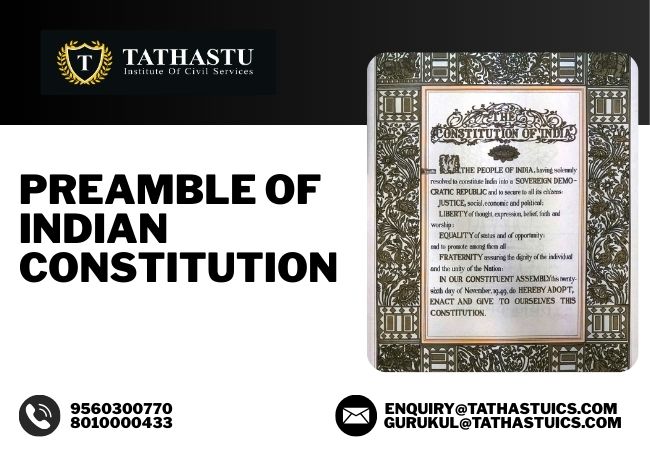What is Preamble?
- The preamble to the Indian Constitution is an introductory statement in the Constitution. It states the purpose of the Constitution.
Components of Preamble
- The constitution gets its authority from the people of India.
- The Preamble states that India is a Sovereign, Socialist, Secular, Democratic and Republican country.
- The Preamble stipulates Justice, Liberty, Equality and Fraternity as its objectives.
- The Preamble sets November 26, 1949, as the date of its adoption.
| Note: The 42nd Constitutional Amendment Act (1976), has added three new words – Socialist, Secular, and Integrity. |
Key Words in Preamble to Indian Constitution
- “We, the People of India”– This phrase signifies that the authority and legitimacy of the Indian Constitution come directly from its people.
- Sovereign– The term ‘sovereign’ denotes that India is a self-governing and independent state, neither dependent on nor dominated by any other nation.
- Socialist– The term ‘socialist’ reflects the vision of a socio-economic system that ensures the equitable distribution of wealth, resources, and opportunities, striving to minimise economic inequalities among citizens.
- Secular – The word ‘secular’ underscores the principle of religious neutrality, ensuring that the state remains separate from religious affairs.
- Democratic- The term ‘democratic’ signifies the formation of a government that derives its authority from the people and remains answerable to them.
- Republic- The term “republic” signifies a form of government where the head of state is elected by the people or their representatives, rather than being hereditary or appointed based on lineage.
- Justice- The term ‘justice’ reflects the Indian state’s commitment to upholding social, economic, and political justice for all its citizens.
- Liberty- The term ‘liberty’ refers to the freedom from undue restrictions on individual actions while ensuring opportunities for personal growth and development.
- Equality- The term ‘equality’ signifies the elimination of special privileges for any particular group and the assurance of fair opportunities for all individuals without discrimination.
- Fraternity- The term “fraternity” emphasises the importance of fostering a sense of brotherhood and unity among all citizens.
Is the Preamble a Part of Indian Constitution?
- In the Berubari Union Case (1960), the Supreme Court ruled that the Preamble is not a part of the Constitution, although it reflects the intent of the framers and can be used as an aid in interpreting any ambiguities within the Constitution.
- As a result, the Preamble was considered non-binding but could serve as a reference for interpretation.
- However, this position was overruled in the Kesavananda Bharati vs. State of Kerala (1973) case, where the Supreme Court established that the Preamble is an integral part of the Indian Constitution and plays a crucial role in the interpretation of statutes and constitutional provisions.
- Later, in the LIC of India vs. Consumer Education & Research Centre (1995) case, the Court reaffirmed that while the Preamble is an essential part of the Constitution, it cannot be directly enforced in a court of law.
Can the Preamble Be Amended?
- In the Kesavananda Bharati Case (1973), the Supreme Court held that while the Preamble is part of the Constitution and can be amended, such amendments must not alter the Basic Structure or Fundamental Features of the Constitution.
- Based on this ruling, the Preamble has been amended only once, through the 42nd Constitutional Amendment Act (1976), following the recommendations of the Sardar Swaran Singh Committee.
- The amendment introduced the terms ‘Socialist’ and ‘Secular’ between ‘Sovereign’ and ‘Democratic’, and also modified ‘Unity of the Nation’ to ‘Unity and Integrity of the Nation’, reflecting the evolving aspirations of the country.
In conclusion, the Preamble serves as the soul of the Constitution, embodying the fundamental values and guiding principles upon which the nation is built. It reflects the aspirations of the people and lays the foundation for justice, liberty, equality, and fraternity.

